World Humanitarian Day 2021 | Lepra’s humanitarian response to mitigate the impact of COVID-19 for people affected by leprosy and lymphatic filarisis
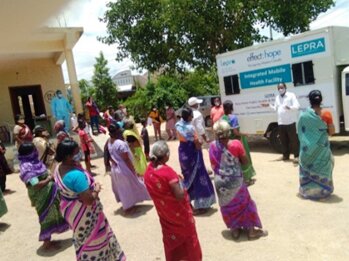
Authors: Dr Aparna Srikantam and Dr. Michael Sukumar Pallapati LEPRA – Blue Peter Public Health and Research Centre, India; on behalf of the NTD NGO Network’s Disease Management, Disability and Inclusion; and Conflict and Humanitarian Emergencies Working Groups.
Every day stories are coming out about the devastation COVID-19 is causing all across the world. COVID-19 caused the disruption of many NTD interventions. However, as part of the NTD NGO Network (NNN), we continue to see member organisations identify opportunities and continue to develop tools to advance our important health promoting efforts.
During the COVID-19 crisis many people affected by leprosy have lost their livelihoods. With little to no savings to fall back on, families are on the verge of starvation. People living in marginalised communities, like leprosy settlements and rural villages endemic to lymphatic filariasis (LF), have had poor access to COVID-19 services. Unless their immediate needs are met, these families and their local communities will struggle to be a part of the sustainable response to the COVID-19 pandemic.
Lepra’s humanitarian response focused on the challenges faced by people affected by leprosy and LF, and subsequently set in motion a multipronged approach; in-clinic and mobile COVID-19 testing, food-aid packages for those who had lost their livelihood, oxygen concentrators were delivered to local hospitals, and as of April 2021, Lepra was also able to provide COVID-19 vaccinations. Thus, from April 2020 until now, Lepra has been able to provide a full range of COVID-19 services for the people affected by leprosy and LF in India.
Response 1: COVID-19 PCR testing
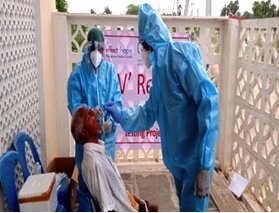
Responding to the pandemic, Lepra’s Blue Peter Public Health and Research Centre (BPHRC) made the necessary preparations and upgraded its laboratory, as per the protocol of the Government of India, for COVID-19 testing laboratories. Subsequently, BPHRC was accredited by the Government of India to conduct COVID PCR tests. 12,400 COVID-19 PCR tests were conducted by Lepra in India between April 2020 and July 2021. PCR testing is the first step towards diagnosis and further management of COVID-19, and Lepra has offered untiring efforts to provide this service with strict adherence to the government’s directives and guidelines.
A mobile integrated health facility was also opened at Kushnapally village of Kumaram bheem district enabling BPHRC to provide mobile COVID-19 PCR testing to people affected by leprosy residing in leprosy settlements in Nalgonda, Hyderabad, and to remote communities in the Kumaram Bheem district of Telangana. The mobile integrated health facility project was funded by Canadian charity, Effect:hope, and Lepra UK, and provided CBNAAT (Cartridge Based Nucleic Acid Amplification) tests for COVID-19 and tuberculosis, and slit skin smear microscopy for leprosy case detection and management. A total of 1,726 people were reached in providing COVID RTPCR tests through the mobile integrated health facility, with any positive cases being referred to a government health facility for further management.
Response 2: Food aid packages distributed to 38,823 families and affected by leprosy and LF between April 2020 and March 2021
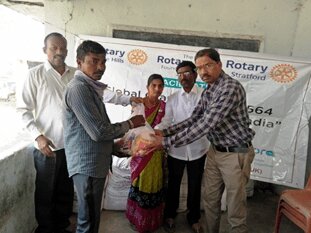
COVID-19 lockdowns have affected, in one way or another, all aspects of life. Economy and livelihoods have been severely affected, leading to a worsening of poverty. People have been unable to feed themselves and their families. In what seemed like a hopeless situation, with a dire necessity for nutrition, Lepra geared up to support people affected by leprosy, marginalised and poverty stricken. Food aid packages have been delivered to 1208 families in the urban slums and remote villages of Telangana, 1,095 families in Madhya Pradesh state, 3,144 in Bihar, 1058 families and 1100 PLHIV, 220 persons affected by leprosy, 55 persons affected by lymphatic filariasis in Andhra Pradesh and 32, 318 families in Odisha.
Response 3: The COVID-19 Emergency Vaccination Programme
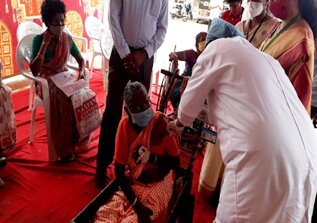
Over 15,500 people affected by leprosy or LF have received the COVID-19 vaccine through Lepra’s COVID-19 Emergency Vaccination Programme, funded by Lepra UK, Effect:hope and American Leprosy Mission, India.
Lepra’s self-support groups and the Association of People Affected by Leprosy (representing people living in leprosy settlements), were the main vehicles for enlisting people affected by leprosy for vaccination and providing on-going support. COVID-19 community awareness raising sessions took place across communities, and were a platform to clear misconceptions, and drive vaccination uptake across leprosy settlements. The COVID-19 vaccination project took place in the states of Uttar Pradesh, Madhya Pradesh, Andhra Pradesh, Odisha, Jharkhand and Bihar. A total of 15,523 persons affected by leprosy have received the vaccine.
Response 4: Oxygen relief
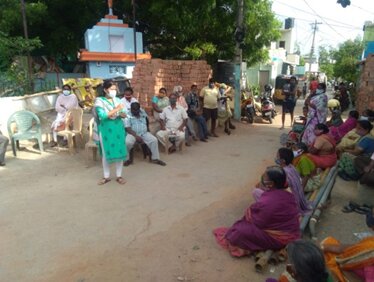
When the second wave of COVID-19 hit India, there was a steep rise in the demand for hospital beds and oxygen, which both the government and the private sector could not meet. The cost of oxygen in the private sector was exorbitant, and not affordable for the vast majority of the COVID-19 affected patients. In this context, Lepra collaborated with Mission Oxygen, a group of concerned individuals who aimed to alleviate the oxygen crisis in India. A total of 80 oxygen concentrators were supplied to local hospitals across the states of Telangana and Andhra Pradesh.
World Humanitarian Day is a day that brings together partners from across the humanitarian system to advocate for the survival, well-being and dignity of people affected by crises, and for the safety and security of aid workers. This pandemic has demonstrated that governments and partners can band together to advocate for improved hygiene, oxygen relief, good handwashing practices. If this can be done for COVID-19, this can be done for other diseases. NTD programmes have reached over a billion people for the last four years, and this World Humanitarian Day, we stand in solidarity with NNN and its 80+ member organizations globally, working together to improve health for the world's most vulnerable populations and build a brighter future and bring health for all.